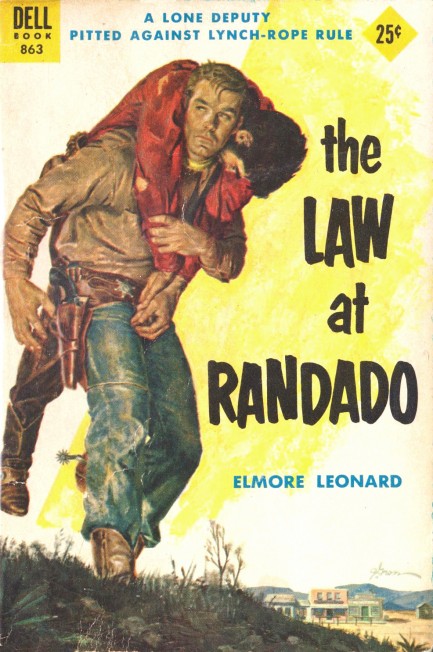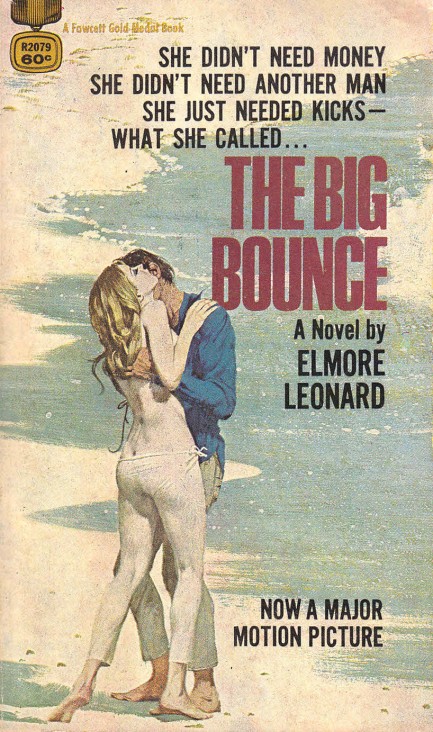
This is where being deputy in a one-horse town really sucks.

Elmore's Leonard's second novel The Law at Randado was published in 1954, and it debuted in paperback as this Dell edition with evocative George Gross cover art. Leonard wrote scores of fascinating characters during his long career. The villain here is yet another. Arizona cattleman Phil Sundeen inherited his wealth but pretends he earned it. Though he doesn't truly have a head for business the sheer size of his fortune prevents his numerous failures from ruining him. He commits transgressions that range from the rude to the unethical to the outright illegal. Men work for him knowing they'll eventually be humiliated or cheated, but they tell themselves that maybe there's a way to benefit from the relationship before it implodes.
When Sundeen's stupidity and vanity catalyze a deadly mob, deputy sheriff Kirby Frye wants to hold him to account. Though Sundeen encouraged the chaos, rather than physically taking part, there's no doubt he's responsible for the deaths. But most of the people in the town of Randado defend Sundeen. They all harbor fantasies that by staying on his good side fortune will one day smile upon them. His inner circle protect him, but they know he's wrong. They've gained considerable prestige clinging to him, but they try to make him face the reality of his situation anyway, only to learn that their enablement of him—and the enablement of all the sycophants who came before them—have warped Sundeen's sense of reality:
Sundeen looked up now, faintly grinning. “R.D., you old son of a bitch, you telling me [I'm] wrong?
“I'm facing the facts!”
“Facts don't mean a thing.”
“They do when you're faced with them!”
“I don't see 'em facing me. George, you see any facts facing [me]?”
And presented with this, Sundeen's enablers toss what remains of their integrity into a ditch. In public they claim his obvious crimes are not crimes at all, but they know they're lying, and in private they realize he will only get worse. So does Deputy Frye, which is one reason he's determined to apply the law to Sundeen, same as anyone else. His legal authority comes straight from the county seat in Tucson, but that authority means little to a group willing to see their meal ticket as oppressed by an illegitimate government. Frye has no inkling of where his ideals of evenhanded justice will lead, or what they will cost.
Elmore Leonard was a clever conceptualist—one of the best. The Law at Randado is at its core a tale of order versus chaos, central government over local law, and of whether people believe in the oft-cited principles of what America claims to be. When push comes to shove, those who support Sundeen want those principles binned. Even Frye's girlfriend wants Sundeen to be given a pass, and not just because her father is one of Sundeen's clan. She believes what other townspeople believe: that politicians in Tucson have no right to tell people in Randado what to do. Frye's stubborn insistence on law and order is at first an irritant to Sundeen, then an affront, then a legitimate threat that must be destroyed.
One magical aspect of fiction is that, in skilled hands, what seems murky in real life can be made utterly clear on the written page. Elmore Leonard died nearly a decade ago, so The Law at Randado isn't about events of recent years, but it's relevant because it's about the willingness of some to view the enforcement of the law as transactional. To such people the law is sacrosanct, but only as long as it's applied to others. Leonard explores a foundational civic paradox—that people accumulate power thanks to the stability and protection of the law, then suddenly believe the law exists only as a tool for their ambitions and desires. The Law at Randado explores that idea and does it exceedingly well.

Perfect for special occasions.

This promo photo in vibrant color shows Argentine actress Linda Cristal, performer in numerous western films and television series. Our favorite movie of hers isn't a true western, but almost fits the bill. It's Mr. Majestyk, with Charles Bronson, based on a great Elmore Leonard novel about a farmer and some migrant workers. Cristal is yet another celeb who had an interesting name change. You understand how Spanish and Latin American naming conventions work, with, often, two first names, two last names, and sometimes even middle names added, right? Cristal's full name was Marta Victoria Moya Peggo Burges. We think Marta Victoria would have worked fine as a stage name. Or better yet—Marta Moya. That has a nice alliterative flow. Or maybe even Marta Peggo. Actually, scratch that one. Peggo Burges? No? Well anyway, she chose Linda Cristal, which is fine, and as you Spanish speakers know, it's a combo of the words for “cute,” or “pretty,” and “glass,” or “crystal.” We'll go with pretty glass. The name fits. Cristal just died a couple of weeks ago in Beverly Hills, where she had resided for many years. The photo is from around 1955.

Elmore Leonard's first crime novel is all ups and no downs.

Elmore Leonard published until 2012, and is thought of as a contemporary novelist rather than a mid-century writer, but The Big Bounce appeared long enough ago to get pulp cover treatment right when that style was fading. The Fawcett Gold Medal movie tie-in edition of the book has Robert McGinnis on the art chores, and this is it for Leonard good girl art, as far as we know. Apparently, he finished the book in 1966 but had it rejected by publishers for three years, a shocking fact considering he already had five novels on the market. But those were westerns and The Big Bounce was Leonard's first crime novel. That's no excuse, really. It should have been published immediately, but publishers are motivated by factors other than literary quality, as a rule. The book is a fun ride involving an ex-con who gets mixed up with some petty thieves and a thrill seeking femme fatale who wants help ripping off her sugar daddy. It has many of the elements Leonard would later perfect—the elliptical plotting, the dialogue that rings so true to the ear, and the mid-scene ending. The Big Bounce is a ball, well worth your time.

American literary giant Elmore Leonard dies.

After suffering a stroke a few weeks ago, American author Elmore Leonard died at his home in Detroit this morning. Tens of thousands of words will be written about Leonard’s contributions to literature, but we’ll let him speak for himself in this scene featuring a character named Neely Tucker, a journalist intent on perfectly remembering everything that happens, as he witnesses a brewing confrontation between a Cuban military officer and a tough cowboy in a supper club in Havana, Cuba, 1899:
It surprised Neely that Teo didn’t acknowledge Amelia first, ask her pardon for interrupting, walking up to the table unannounced. Amelia’s eyes were glued to the two men facing each other, Teo saying now in a very formal manner, “I request that you meet me tomorrow…” with an accent but the words clear enough: that Tyler meet him in the morning at first light in the Prado by the statue of Her Majesty Queen Isabella, Teo saying his second, Major Lionel Tavalera, would bring the pistols and Tyler would be given his choice of which one he would prefer to use.
Look at Amelia’s eyes, big as saucers, the sweet thing hanging on every word.
Tyler said, “I thought you wanted to sword fight.”
She loved it, looking at Tyler almost adoringly.
Tyler saying, “Now you want to shoot me. ’Cause I wouldn’t saddle a horse for you?”
Neely would tell her later her mouth was open and it distracted him, made it hard for him to concentrate on the details, and he didn’t want to take out his notebook—how would that look? He’d have to remember what was said.
Teo was saying now, “You insult me.”
Tyler asking him, “How do I do that?”
“The way you speak. You show no respect.”
“Why should I respect you?”
“There. You see?”
“What you need to do,” Tyler said, “is get over your touchiness. You understand what I mean? You’re too sensitive, got a thin skin on you. I’m not gonna stand out there by a statue and let you aim your pistol at me, not over something as piddling as you wanting your own way.”
There was no mistaking the hussar officer’s expression of hostility. Neely noted the narrowing of his eyes to slits; he glanced at Amelia to see the adorable creature completely absorbed.
Spellbound.
Tyler saying now to Teo, “You have a war going on. Doesn’t it give you enough people to kill?”
Teo didn’t waste a moment. Neely watched him shift his gloves from his left to his right hand and crack Tyler across the face, stinging him good with those kid gloves—harder in fact than need be, only the formality of the slap required and ordinarily accepted as a challenge. What was in no way part of the duello rites was Tyler cocking his fist and driving it hard into Teo’s wide-eyed expression, sending him stumbling back off-balance all the way to the bar, where Lionel Tavalera caught him around the shoulders and kept him on his feet. Neely could see that Teo, now the center of attention, wanted no help from anyone. He used his elbows to free himself of Tavalera, and Neely thought, Now what? Rant and rave? Promise the American he’ll kill him for sure on the morrow?
No, what Teo did, he drew a short-barrel pistol from inside his suit—a .32, it looked like—extended the weapon in what must be a classic dueling pose in the direction of Tyler, barely more than six paces away, and while he was taking deliberate aim, intent on an immediate finish to this business, Tyler pulled a big .44 revolver from inside his new alpaca coat and shot Teo Barbón in the middle of the forehead. My Lord, the sound it made! And there, you could see the bullet hole like a small black spot, just for a moment before Teo fell to the floor.
That’s how magical writing can be, how masterly. Leonard shifts from past tense, to simple present tense, to progressive present, to future, and even mixes in conditional mood effortlessly, as he shuffles Neely Tucker’s in-the-moment observations of the incident with his concerns about how he’ll write it up for his newspaper and his internal dialogue concerning the beautiful onlooker Amelia Brown. All in that passage. That’s how good he was. And the rhythm of his long, multi-clause sentences—because writing is crucially rhythmic—is mesmerizing, aided by his careful use of punctuation.
Those lines are from his best book, in our opinion, Cuba Libre, which is not one of his standard American westerns nor one of his many hard-boiled crime books, but rather an adventure set in Cuba on the eve of the Spanish American War, and it’s one of the books people will remember, and probably study in college courses. Yes, Leonard breaks some of the unspoken rules of elegant writing, yet rules are often successfully broken by great artists—indeed, it’s almost a pre-requisite.
A couple of years ago, a long article appeared in The Guardian and their book critic pointed out that Leonard was not a great a crime novelist or a great western novelist, but simply a great novelist, one of the best writing in English and had been for at least twenty years. He said a shift had begun to occur in literary circles and critics were beginning to realize nobody else in any genre or branch of literature could do what Elmore Leonard did. Dead today at age eighty-seven.












































































